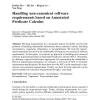Free Online Productivity Tools
i2Speak
i2Symbol
i2OCR
iTex2Img
iWeb2Print
iWeb2Shot
i2Type
iPdf2Split
iPdf2Merge
i2Bopomofo
i2Arabic
i2Style
i2Image
i2PDF
iLatex2Rtf
Sci2ools
100
click to vote
KAIS
2007
2007
Handling non-canonical software requirements based on Annotated Predicate Calculus
Eliciting requirements for a proposed system inevitably involves the problem of handling undesirable information about customer’s needs, including inconsistency, vagueness, redundancy, or incompleteness. We term the requirements statements involved in the undesirable information non-canonical software requirements. In this paper, we propose an approach to handling non-canonical software requirements based on Annotated Predicate Calculus (APC). Informally, by defining a special belief lattice appropriate for representing the stakeholder’s belief in requirements statements, we construct a new form of APC to formalize requirements specifications. We then show how the APC can be employed to characterize non-canonical requirements. Finally, we show how the approach can be used to handle non-canonical requirements through a case study. Keywords Software requirements · Inconsistency · Redundancy · Incompleteness · Vagueness · Paraconsistent logic
| Added | 16 Dec 2010 |
| Updated | 16 Dec 2010 |
| Type | Journal |
| Year | 2007 |
| Where | KAIS |
| Authors | Kedian Mu, Zhi Jin, Ruqian Lu, Yan Peng |
Comments (0)

